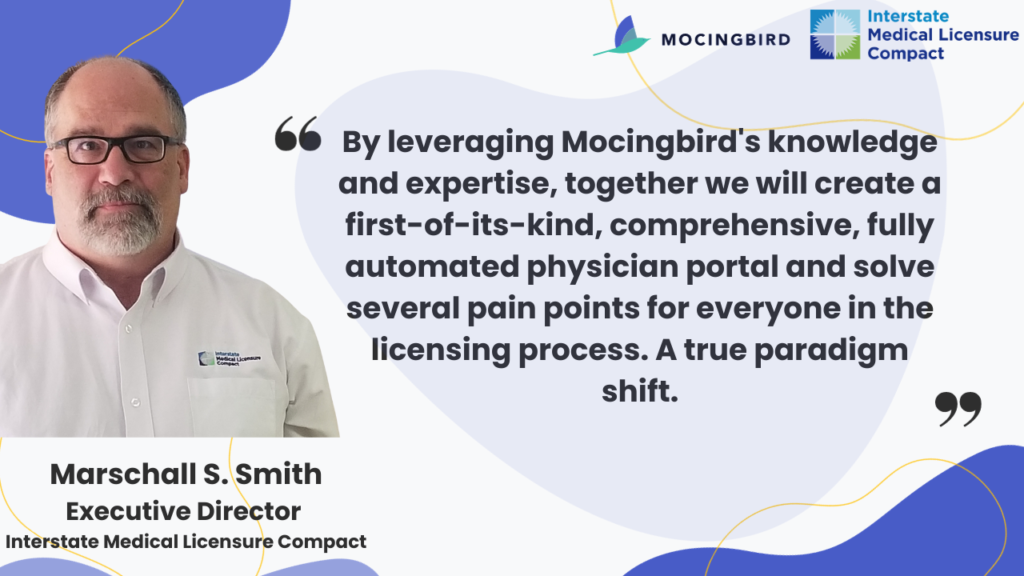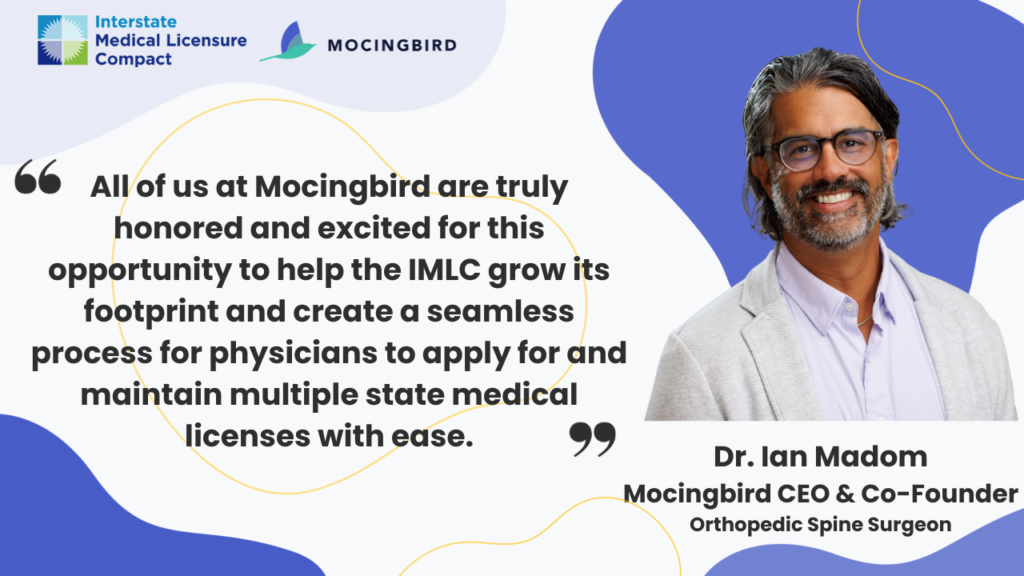Mocingbird expands its platform to support the American Board of Orthopaedic Surgery (ABOS) with the WLA pathway, helping orthopaedic surgeons manage licensure, CME, and certification with ease.
Mocingbird now supports the Nurse Licensure Compact (NLC), streamlining multi-state license management for nurses. This new feature reduces administrative burdens and helps ensure compliance, allowing nurses to focus on patient care.
Managing multiple malpractice insurance certificates is now easier with Mocingbird's COI folder. Centralize storage, clear expiration dates, and streamline sharing—all in one secure location. Enhance your career flexibility and focus on patient care while we handle the administrative details.
Mocingbird is excited to announce its expansion to support Licensed Clinical Social Workers (LCSWs) across all 50 states and the District of Columbia. Our platform simplifies compliance management and Continuing Education tracking, providing LCSWs with a tailored, comprehensive solution to stay organized and focused on patient care.
In this interview, Stacy Harris, Chief Revenue Officer at Mocingbird, shares how the platform is transforming continuing medical education. Learn how Mocingbird helps clinicians efficiently manage their credentials, ensuring they stay compliant while focusing on patient care.
In this interview with Providence Business News, Sarah Bishop shares her journey ascending from Senior Director of Operations to Chief Operating Officer at Mocingbird. With a focus on enhancing operational efficiency and fostering collaboration, Bishop's expertise in medical credentialing and leadership underscores Mocingbird's commitment to innovation and excellence in healthcare operations.
In this interview, explore the collaboration between Mocingbird and the IMLC, aimed at streamlining physician licensing across states. Uncover how their innovative technologies are empowering healthcare professionals to focus on patient care, while revolutionizing administrative tasks.
In an interview with Providence Business News, Dr. Ian Madom, CEO of Mocingbird, discusses the development of the Enhanced Physician Portal for the Interstate Medical Licensure Compact Commission. This portal aims to streamline multistate licensing for over 16,000 physicians, improving healthcare access nationwide. Dr. Madom highlights Mocingbird's expertise in simplifying certification compliance and enhancing patient care in underserved areas.
Mocingbird has appointed Sarah Bishop as the new Chief Operating Officer, recognizing her expertise in medical credentialing. Bishop's leadership promises to enhance operational efficiency and foster innovation in CME management for healthcare professionals and organizations.
Project aims to create best-in-class system to streamline licensing for medical professionals, administrators, and state agencies.
Continuing its mission to eliminate the endless inefficiencies associated with the medical licensing process, the Interstate Medical Licensure Compact Commission (IMLCC) today announced it has selected Mocingbird to bring a best-in-class Enhanced Physician Portal (EPP) into reality.
After reviewing 10 applications for the project, the IMLCC selected Mocingbird to build, implement, and maintain the EPP for the over 16,000 physicians in its 41 member states and territories. With the creation of the portal, the IMLCC seeks to make it easier for physicians who want to practice in multiple states to acquire the appropriate licenses, thus increasing access to medical care in underserved communities, expanding the use of new medical technologies, and improving the continuum of care for out-of-state patients, among other benefits.

“Since our formation in 2017, IMLCC has helped more than 16,000 physicians in member states secure more than 80,000 licenses, oftentimes cutting in half the cost and time associated with the process. While we’ve successfully torn down multiple silos over the years, our current system, with a cumbersome interface, is not built for the end user,” said IMLCC Executive Director Marschall S. Smith. “By leveraging Mocingbird's knowledge and expertise, together we will create a first-of-its-kind, comprehensive, fully automated physician portal and solve several pain points for everyone in the licensing process. A true paradigm shift.”
Founded by practicing physicians, Mocingbird is a cloud-based platform that automates clinician certification compliance by eliminating the chaos of ongoing credentialing and delivering high-impact CME. The company plans to implement the same patented technology that powers its current rules engine to build the EPP. Once complete, the EPP will serve as a single repository for physician demographics, practice information, and primary-sourced continuing medical education (CME) information.

“All of us at Mocingbird are truly honored and excited for this opportunity to help the IMLC grow its footprint and create a seamless process for physicians to apply for and maintain multiple state medical licenses with ease,” said Mocingbird Co-Founder and CEO, Dr. Ian Madom. “Our team is uniquely positioned to serve the very specific needs of the IMLC. Not only are our missions closely aligned but, by utilizing physician input and feedback while developing every aspect of our current Mocingbird platform, we also have experience in creating an environment that is ‘for physicians, by physicians.’”
How the IMLC Streamlines Licensure
The licenses are still issued by the individual states – just as they would be using the standard licensing process – but because the application for licensure in these states is routed through the Compact, the overall process of gaining a license is significantly streamlined. Physicians receive their licenses much faster and with fewer burdens.
After the State of Principle License (SPL) has verified a physician’s eligibility for the Compact, the application and “core data” is provided to the states where the physician wants to practice medicine. By using expedited, primary source verified information-sharing, participating states are able to significantly speed up the licensure process.
The licensing is all state-based. The Commission does not issue a “Compact license” or a nationally recognized medical license for physicians.
Only states and territories that have formally joined the Compact can participate in this streamlined licensure process. In order to participate in the Compact, states and territories must pass legislation authorizing it.
---
About the Interstate Medical Licensure Compact Commission
The Interstate Medical Licensure Compact Commission governs and administers the Interstate Medical Licensure Compact. Currently consisting of 39 states, the District of Columbia, and Guam - the Compact is an agreement among participating U.S. states and territories to work together to significantly streamline the licensing process for physicians who want to practice in multiple states. It offers a voluntary, expedited pathway to licensure for physicians who qualify. The mission of the Compact is to increase access to health care – particularly for patients in underserved or rural areas. The Compact makes it possible to extend the reach of physicians, improve access to medical specialists, and leverage the use of new medical technologies, such as telemedicine. While making it easier for physicians to obtain licenses to practice in multiple states, the Compact also strengthens public protection by enhancing the ability of states to share investigative and disciplinary information.
---
About Mocingbird
Mocingbird is a SaaS management platform dedicated to improving medicine and clinician well-being. Our comprehensive solution eliminates the chaos of ongoing credentialing and delivers high-impact Continuing Medical Education (CME). With Mocingbird, individual clinicians gain a convenient one-stop solution to validate, track, document, and calculate their CME requirements for professional license maintenance. Healthcare organizations benefit from a powerful management tool that provides a real-time compliance overview for effective risk mitigation. Founded by Interventional Cardiologist, Dr. George Fernaine, and Orthopedic Spine Surgeon and CEO, Dr. Ian Madom.


